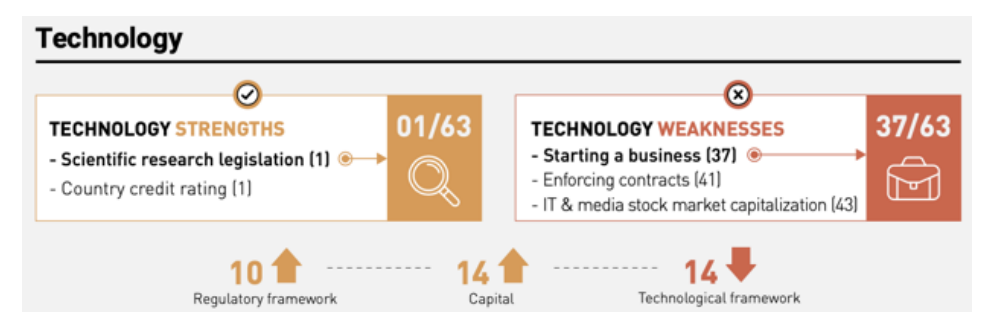
An event of collaboration
Jointly organised by IMD (Institute for Management Development in Lausanne), École polytechnique fédérale de Lausanne (EPFL) and digitalswitzerland, representatives from academia, politics and business, including guest speakers, economist Marina Mazzucato and venture capitalist Klaus Hommels, interpreted and evaluated the latest results of the IMD World Digital Competitiveness Ranking.
Understanding the ranking
The IMD World Digital Competitiveness Ranking is compiled annually based on indicators that focus on education, technology and the level of future-readiness. This year, The United States and Singapore came in first and second, respectively, with Denmark in third place and Sweden in fourth place.
Switzerland’s successes and weaknesses
Marc Walder, founder of digitalswitzerland drew attention to the importance of preparing Switzerland for the upcoming challenges of digitalisation. “Today’s published IMD ranking on digital competitiveness is a great indicator to show the progress we have made in Switzerland and at the same time, remind us how much work still lies ahead.” Switzerland’s strong position can be explained by its top results in several key areas.

In the technology category, Switzerland can benefit from legislation to promote scientific research and from its financial stability. According to the IMD ranking, the conditions for setting up companies and promoting startups in Switzerland need to be improved.

In the third main category “future-readiness,” Switzerland’s strength lies in knowledge transfer. In contrast, the study sees a backlog demand in eParticipation.

Rich opportunity for improvement
Participants agreed that this is not the time for Switzerland to get comfortable. Digitalisation is rapidly advancing as every nation continues to navigate its response and recovery to the Covid-19 pandemic. China for instance made advancements this year in future readiness, sitting 18 places higher than it did last year, while Denmark and Sweden bettered their knowledge building.
Investing to support innovation
Dr. Klaus Hommels, venture capitalist and founder of Lakestar, discussed the importance of investments to support innovation. Switzerland is an excellent place to invest from and has all the right ingredients to do so. Lakestar has invested in European payment systems to ensure digital sovereignty in Europe. However, Europe also needs to find some “European champions”, such as the worldwide known AliBaba for example.
Challenging traditional thinking
University College London Professor Mariana Mazzucato, special guest of the Summit stressed, “We should not obsess about technology but about problems that require different types of investments and innovative solutions across the economy. After all that is where the Internet came from. With such outcome-based thinking, the public sector is a key investor on both the supply side and the demand side.”
Looking to the future
All speakers agreed that this ranking list helps Switzerland critically assess its strengths, but also weaknesses and this is a powerful catalyst to learn and improve ahead of next year’s ranking.
Watch the live stream of the Digital Competitiveness Summit.
The Digital Competitiveness Summit 2021 will take place on 5 October at 18:00 – 19:30.







